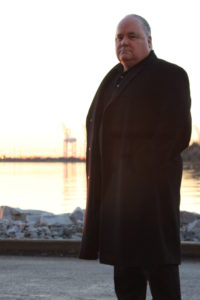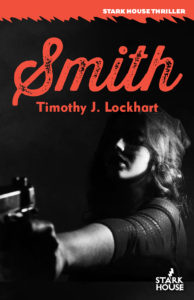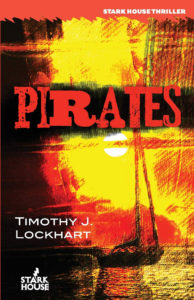
A Conversation with Timothy J. Lockhart
Lowestoft Chronicle interview by Nicholas Litchfield (April 2019)

Crime writer Timothy J. Lockhart, a Former U.S. Navy intelligence officer and retired Navy Reserve captain who now works a lawyer in Virginia, has published many articles and book reviews in a variety of publications, most notably The Virginian-Pilot. In 2017, his debut novel, a suspense thriller titled Smith, garnered strong critical reviews, with Booklist remarking on the “beautifully wrought scenes” and “artfully done violence.” His subsequent book, Pirates, published this past April by Stark House Press, is a modern-day high-seas thriller that is set in the hazardous rough waters of the Caribbean. Another standalone novel with a tough, ex-military central character, Pirates has the same taut, suspenseful prose and disturbing blend of violence and eroticism that helped make Smith a critical success.
Here, in an exclusive interview with Lowestoft Chronicle, Lockhart discusses his novels, his literary influences, and his writing process.
Lowestoft Chronicle (LC): Your debut novel, Smith, received positive reviews and was praised in Booklist for its “beautifully wrought scenes” and “artfully done violence.” What’s the backstory on the novel? When did you begin this novel and how long did it take to write?
Timothy J. Lockhart (TJL): I began the novel in 2013, and, while working full time as a lawyer, it took me two years to write and polish the manuscript.
I started with the character Smith and the bare bones of a plot and then added other characters and plot events as I went along. I worked without an outline and didn’t know how the story would end until I ended it.

LC: Was this your first completed manuscript or had you been working on others prior to it?
TJL: Smith was the third novel I finished, but the first one I sold.
LC: How would you describe the experience of writing it?
TJL: It was fun actually. I didn’t know where the story would ultimately go, so I kept surprising myself—and I hope that readers were surprised as they went through the novel.
LC: The resilient, hard-as-nails assassin, known only as Smith, is perhaps an unusual choice for a protagonist, especially for a debut author. How challenging was it writing the novel from a female’s perspective? After all, this is a hardboiled tale with steamy scenes, graphic violence, and plenty of feminine introspection.
TJL: I served with quite a number of women in the Navy and had two female bosses (one a Navy admiral and one an Army colonel), so I like to think that I can represent the thinking of a female character, at least to some extent. I have some very helpful women readers who went through the draft manuscript and gave me some pointers. Getting comments on a draft from insightful—and candid—readers is always helpful, in my view.
LC: There’s an interesting article in The Washington Post where you’re quoted at length on the topic of the language of cops. You note that while some writers like Dashiell Hammett came to their knowledge of copspeak through “ride-alongs” with police to get the right flavor and dialogue for their books, probably most crime writers pick up the lingo through TV police dramas and movies and “crime or private eye novels by Elmore Leonard, Raymond Chandler and a host of others.” How would you describe your own approach to writing dialogue? And did your work with the intelligence community help with the writing of Smith?
TJL: Yes, my intelligence background helped a lot, especially with the characters of the Director and the Assistant Director in Smith. I just try to write the way people actually talk, but of course, I leave out all the “ahs,” “umms,” and “you knows.”

LC: Your latest novel, Pirates, is a blend of adventure fiction, thriller, and a modern-day interpretation of the swashbuckler. Here, though, Hal—the tough and courageous hero who saves and defends the beautiful damsel in distress against a dastardly villain—is a grotesquely disfigured, deeply troubled veteran who has withdrawn from society. Although skilled in combat, he’s physically impaired, mentally scarred, and out-of-his-depth when it comes to intimacy. Interestingly, the novel is as much a romance as it is a thriller. Was that always your intention or did the story take a different course during the writing of it? Was writing this novel a faster, smoother process than Smith?
TJL: I wrote a draft of Pirates before I wrote Smith, but after I sold Smith I went back the significantly reworked Pirates. The novelist Rick Ollerman gave me great advice about revising the beginning of the story, and Greg Shepard (my publisher) and an insightful reader friend named Warren Tisdale gave me great advice about revising the ending. So the as-published book is quite different (and, I hope, better) than the original manuscript.
LC: As was the case with Smith, the character Hal is a psychologically wounded former soldier who is given a new purpose in life. Both Hal and Smith are not so much seeking redemption as discovering how to love again and finding themselves in a situation where they must fight for others and their own survival. In the case of both of these novels, did the story or the characters develop first? How detailed were your outlines before you began work on these novels?
TJL: I started with the characters of Smith, Hal, and Ana in the two books. I had an outline for Pirates but ended up not following it much. I didn’t use an outline for Smith, and I’m not using an outline for the novel I’m writing now. For me, it seems to work better just to jump off the diving board and see where and how I land.
LC: For many years, you’ve reviewed books of all different literary genres, and yet with your own fiction writing, it seems you favor crime fiction. Did you adapt your writing to appeal to this market to forge a literary career or do you most enjoy writing thrillers with hardboiled protagonists?
TJL: I write the kind of fiction I like to read: hardboiled crime fiction that breaks new ground—or at least tries to. I also enjoy reading nonfiction—mostly biography and history—but I haven’t tried writing any yet although I do have a few ideas for nonfiction books.
LC: When did you actively start writing fiction for publication? Your story “Last Night at the Skipper’s Lounge” appears in a 2017 issue of Down & Out Magazine. Is this a one-off short story or have you been writing others?
TJL: I’d written a couple of novels prior to Smith, and the process of writing and rewriting them was my apprenticeship, so to speak. Smith was the first novel I wrote with the definite goal of selling it, and that’s how things turned out.
I’m primarily a novelist, not a short story writer. Rick Ollerman encouraged me to try a short story, and “Skipper’s Lounge” was the result. I have ideas for other short stories and may get to some of them after I finish the new novel.
LC: Who would you credit as the writers who influenced you the most? I remember you once reviewing the work of Gil Brewer and speaking very highly of him. Would he be one of your key influences?
TJL: Gil Brewer, David Goodis, Hammett, Chandler, Cain, Elmore Leonard, the American Charles Williams, the early John D. MacDonald…I could go on and on. Any good fiction that I’ve read has influenced me in some way…often by making me wish I could write that well!
LC: You’ve written for numerous journals and newspapers over the decades and have been a correspondent for The Virginian Pilot for many years. How and when did you get involved in journalism? What was the first piece you had published?
TJL: I began writing for the school newspaper when I was about 12 years old and have been writing ever since. If I hadn’t been first a Navy officer and then a lawyer, I probably would have gone into journalism. But I like the way things have worked out—I’ve been very lucky.
LC: Are you currently working on a new manuscript, and will you continue to focus on suspenseful thrillers?
TJL: Yes, and yes. I’ve finished two more novels in draft and am now polishing them for publication. And I have a fifth novel underway. So stand by for more thrills and chills to come!
About the Author
Timothy J. Lockhart is a lawyer and former U.S. Navy officer who worked with the CIA, DIA, and Office of Naval Intelligence. He has published articles and book reviews in a variety of publications, including Naval Intelligence Quarterly, Naval War College Review, and The Virginian-Pilot. Stark House Press published his first novel, Smith, in 2017, and his second novel, Pirates, in 2019. He lives in Norfolk, Virginia, with his wife and daughter.
About the Interviewer
Nicholas Litchfield is the founding editor of Lowestoft Chronicle and author of the suspense novel Swampjack Virus. He writes regularly for the Colorado Review, and his book reviews for the Lancashire Post are syndicated to twenty newspapers across the UK. You can read more at his website: www.NicholasLitchfield.com.
